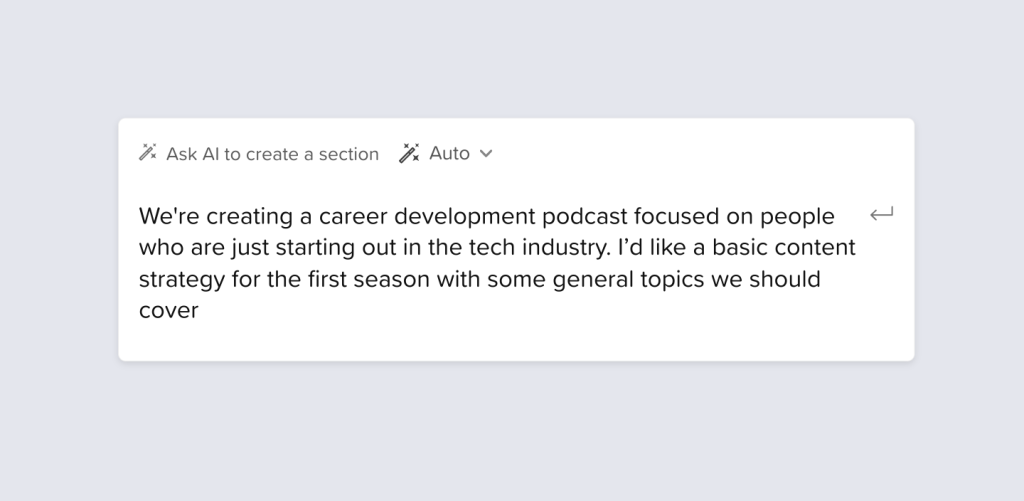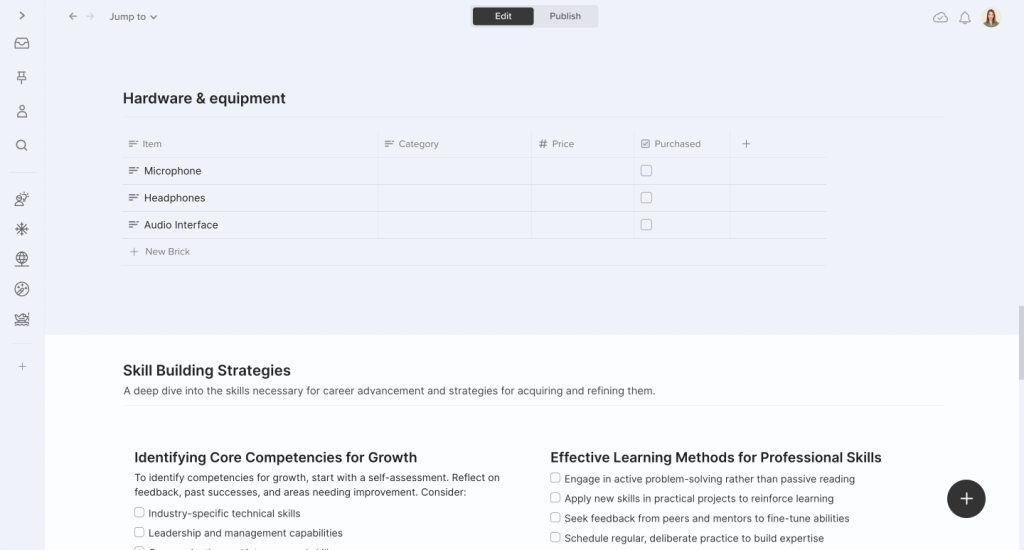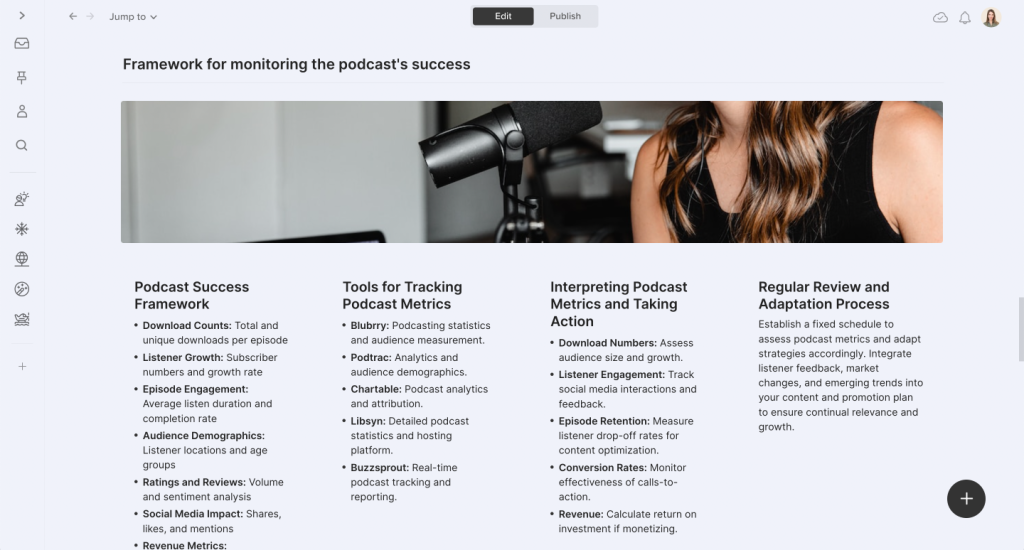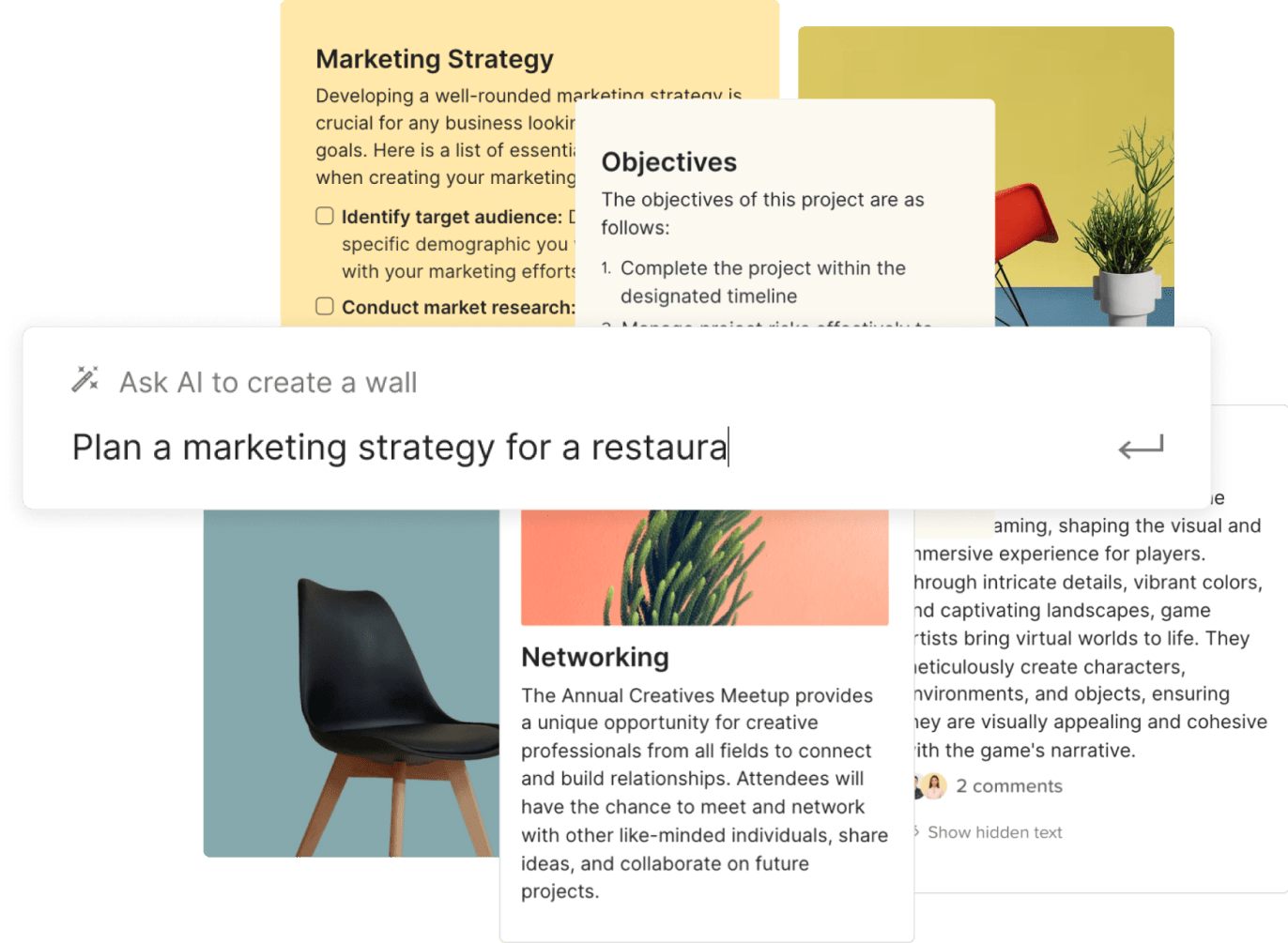Starting a podcast can feel like a daunting task. There are so many moving parts: the kind of equipment you need, figuring out a format for your show, where to host your podcast, whether you should have guests (and where to find them), whether you should find a co-host, the topics that will do best, and so much more. Thankfully, we have AI tools that can simplify a lot of the planning process.
For this article, I’ll be using Walling and ChatGPT to create a plan for starting a podcast. We’ll be figuring out how to start a podcast that features career development tips and has interviews with hiring managers, recruiters, and HR pros.
Pre-Production Planning for Your Podcast
There are a few questions you’ll need to ask yourself before you get started. We’ve already addressed the basic topic for the podcast, and you’ll likely have some ideas about the topic you want your podcast to focus on. For our podcast, we’ve chosen to offer career development advice, with interviews with people who can help listeners advance their careers.
That’s a pretty broad topic, though! There are thousands of industries out there, and the career advice that might work in one industry might not work as well in another. This is where you can ask ChatGPT for information on which industries are growing or which industries provide the best work-life balance. You can also just search for these topics (though using AI can be more efficient).
Determining Your Podcast’s Target Audience
You’ll also want to determine who your target audience is. Are you trying to appeal to a broad audience or something more niche? In our career development topic, we could focus on people who are just starting in their careers, people who are currently in middle management and want to move into more senior roles, or even focus on women or historically underrepresented people in whatever industry we’re focusing on.
For this project, let’s focus on people who are just starting their careers in the tech industry. This is a large market that will allow our podcast to grow while also being specific enough that we can really do a deep dive into the relevant topics.
When figuring out your own target audience, consider your podcast goals. Do you want to become known as an expert in a particular small niche? Do you want to create a podcast with a huge audience? Or something in between?
Creating a Podcast Content Strategy with AI
If a podcast is going to be successful, it needs a content strategy. This is particularly important in the first season, which can make or break a podcast’s success.

This is a great time to use Walling to create a content plan for the first season. First, I asked it for a basic content plan. The prompt I used was:
We’re creating a career development podcast focused on people who are just starting out in the tech industry. I’d like a basic content strategy for the first season with some general topics we should cover.
As with any AI app, it’s important to give Walling a basic idea of what your podcast is about and what you want it to consider when giving you information.
Walling then gave me three basic focus areas for season one: Defining Your Career Goals, Building Technical Skills, and Networking and Building Connections, with a description for each one.
From there, I wanted some more specific episode topics. The prompt I used for that was:
We’re creating a career development podcast focused on people who are just starting out in the tech industry. [I repeated this part to make sure that Walling would give me relevant topics.] Can you give me 10 episode topics we could use for the first season, based on the basic topic ideas outlined in the content strategy above?
Walling gave me ten topics, broken down into four basic areas:
- Getting Started
- Introduction to the tech industry
- Exploring different tech roles
- Building Skills
- Learning programming languages
- Mastering technical skills
- Career Path Exploration
- Choosing a specialization
- Understanding career growth opportunities
- Job Search Strategies
- Crafting a tech resume
- Preparing for technical interviews
- Networking
- Building a solid professional network
- Attending networking events
This is a great starting point for planning out episodes and potentially finding guests to interview for your podcast.
While using AI is a great way to start if you have no idea what to talk about on your podcast, you may already have some ideas. In that case, you can always include the topics you’re already planning to cover and ask an AI tool like ChatGPT to fill in any gaps that might exist.
Choosing Your Podcast Software and Required Equipment
We’ve got the basic outline for our podcast’s first season, but now we need to figure out what equipment we’ll need to actually record those episodes. Walling is great at this. All I had to do to get an equipment list was put in the following prompt within a block in a new section:
Can you give me a list of hardware and equipment I’ll need to record and produce a podcast?

It immediately spit out a list of hardware and basic software needed. What it didn’t cover in this initial list was how to record an interview with a podcast guest. To get that information, I simply created another block with the prompt:
What are some software options for recording podcast interviews via video?
Walling gave me four different options, including Zoom and Skype (which would be the obvious choices) but also including two other software options I hadn’t considered before. It also gave a quick overview of the strengths of each software option.
Once you have a list of equipment and software, you’ll want to read some reviews or potentially find out what other podcasters are using before making a final decision. There are tons of great review sites out there where you can find product recommendations.
Writing and Structuring Podcast Episodes for Season One
There are a couple of ways you could go about deciding on the structure of your podcast episodes. You could listen to dozens of podcast episodes in your niche and try to figure out the structure. You could search for generic “podcast episode structure” articles. Or you could ask Walling to give you the structure for your podcast episodes. That’s what I decided to do. I started out with a simple prompt:
Can you give me a basic structure for a podcast interview that features an interview with a guest?
It immediately gave me a five-part structure for how to structure those episodes. But what if I want to do an episode that doesn’t include an interview? Walling can help with that, too. I just gave it the prompt:
Can you give me a basic structure for a podcast episode that doesn’t include an interview portion?
It gave me a simple structure that included an introduction, three segments exploring different aspects of the topic, and then a conclusion.
Walling has done really well so far with the high-level planning aspects of this podcast. But what about scripting individual episodes? I turned to ChatGPT for help, I gave it the prompt:
“Can you give me a script for an interview episode about learning programming languages, including an introduction, 12 interview questions, and a conclusion?
ChatGPT spit out a usable interview episode script in less than a minute. This is why it’s a great idea to utilize more than one AI tool when creating a project as complex as this.
Scheduling and Organizing Your Podcast Content
For scheduling, creating a calendar view within Walling is a good first step. Remember to schedule when interviews and episodes will be recorded, when they’ll be released, and what marketing efforts you’ll carry out around them.
Two things you’ll want to consider when scheduling your podcast episodes are how often you want to release new episodes and what order to release them in. Most podcast hosts recommend releasing episodes once a week, on the same day each week. This helps your listeners build the habit of listening to your podcast on a regular schedule.
Release Frequency
Granted some podcasters release multiple episodes each week (some even every day), while others release episodes less frequently than weekly. Consider how much time you’ll need to record and produce each episode. It’s better to have a regular but less frequent schedule than to only release episodes sporadically.
Release Order
If your podcast is following any kind of “how to” format, you’ll probably want to release episodes in a logical order. In our example career development podcast, it wouldn’t make sense to release episodes about job search strategies before we talk about the skills you need to land a tech job.
Other podcasts have a more general approach to their niche, and in that case you can have more leeway into what order you release episodes. It’s a good idea to plan out your entire season ahead of time so that you can determine the most logical order to release them in.
You’ll also want to factor in whether you’re going to record the entire season ahead of time and then release episodes, or start releasing them as you produce them. It’s a good idea to have at least a couple of episodes ready to go before you release any, that way if you run into a snag with a guest’s schedule or a production roadblock, you won’t have to skip episodes or change around your schedule.
Your Podcast’s Production Workflow
You’ll also want to make sure you have a solid workflow for producing episodes. Walling came through after feeding it this prompt:
Can you create a workflow checklist with all of the steps necessary for producing a podcast episode, from recording through release?
It created a board with columns for pre-production, production, post-production, and release, with activities that would fall under each category. This is a big time-saver and gives a good starting point for figuring out what you might need to learn to produce your podcast (or deciding where you might need to hire help, like a good editor).
Creating a Comprehensive Marketing Plan
There are so many different strategies out there for promoting a podcast. And it’s one of the most important things you can do when planning a new podcast. After all, what use are amazing episodes if no one listens to them?
Here’s the prompt I used with Walling to get a comprehensive marketing plan:
Can you create a comprehensive marketing plan for promoting a career development podcast aimed at those entering the tech industry? It should include social media, email, and other promotional opportunities, including cross-promotion with other podcasts.
Walling gave me a pretty solid plan for the beginning stages of marketing a podcast, but it was definitely just a starting point. The nice thing is, though, that I can add additional AI blocks in each column and ask for more detailed information. For example, I asked Walling how I could use social media to promote my podcast and it gave me a more detailed list of marketing ideas. This can be done within any section if you want more information.
What Makes a Podcast Successful?
Finally, we need to figure out a framework for deciding what metrics to track to determine how successful our podcast is. Here’s the prompt I used with Walling to find out what I should be tracking and to set up a format for doing so:
Can you create a framework for monitoring my podcast’s success, including columns for which metrics I should track?

Walling gave me a lot of relevant ideas for what to track, including engagement, listener numbers, number of five-star reviews, and more. Starting out, you might not want to spend time tracking all of these (for example, it might take a few episodes before you get any reviews, let alone five-star reviews), but it at least gives you an idea of what you should be looking at moving forward.
Final Thoughts on Using AI to Help You Start a Podcast
All of the planning that goes into starting a podcast can be incredibly time-consuming. Using AI tools like ChatGPT and Walling can speed that up immensely. If you’d rather spend your time diving into actually producing your podcast rather than spending weeks or months planning it, then AI tools are a great fit.
Don’t forget that there are also AI tools out there that can help you with things like audio editing, promotion, and monitoring your analytics. AI doesn’t have to stop being helpful just because you’re done planning!




